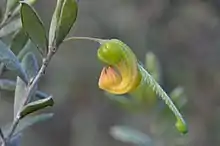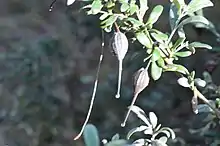| Grevillea montana | |
|---|---|
 | |
| Flower | |
 | |
| Fruit | |
| Scientific classification | |
| Kingdom: | Plantae |
| Clade: | Tracheophytes |
| Clade: | Angiosperms |
| Clade: | Eudicots |
| Order: | Proteales |
| Family: | Proteaceae |
| Genus: | Grevillea |
| Species: | G. montana |
| Binomial name | |
| Grevillea montana | |
| Synonyms[1] | |
Grevillea montana is a species of flowering plant in the family Proteaceae and is endemic to a restricted to a small area of eastern New South Wales. It is a dense shrub with narrowly elliptic to lance-shaped leaves and bright green and pinkish-red flowers.
Description
Grevillea montana is a dense shrub that typically grows to a height of 0.3–1.5 m (1 ft 0 in – 4 ft 11 in). Its leaves are narrowly elliptic to lance-shaped with the narrower end towards the base, or more or less linear, mostly 10–30 mm (0.39–1.18 in) long and 1–7 mm (0.039–0.276 in) wide with the edges turned down or rolled under, often covering the silky-hairy lower surface. The flowers are arranged singly or in clusters of up to four on the ends of branches and are bright green at the base and pinkish-red near the ends with a green style, the pistil 25–28 mm (0.98–1.10 in) long. Flowering mainly occurs in September and October, and the fruit is an oval to elliptic follicle about 12 mm (0.47 in) long.[2][3]
Taxonomy
Grevillea montana was first formally described in 1810 by Robert Brown in Transactions of the Linnean Society of London.[4][5] The specific epithet (montana) means "pertaining to mountains".[6]
Distribution and habitat
The species is known from the southern Hunter Region of New South Wales, from Denman to Kurri Kurri, where it occurs in open forests in sandy soils.[2]
References
- 1 2 "Grevillea montana". Australian Plant Census. Retrieved 13 July 2022.
- 1 2 Makinson, Robert O. "Grevillea montana". Royal Botanic Garden Sydney. Retrieved 13 July 2022.
- ↑ "Grevillea montana". Australian Biological Resources Study, Department of Agriculture, Water and the Environment: Canberra. Retrieved 13 July 2022.
- ↑ "Grevillea montana". APNI. Retrieved 13 July 2022.
- ↑ Brown, Robert (1810). "On the Proteaceae of Jussieu". Transactions of the Linnean Society of London. 10 (1): 172. Retrieved 13 July 2022.
- ↑ Sharr, Francis Aubi; George, Alex (2019). Western Australian Plant Names and Their Meanings (3rd ed.). Kardinya, WA: Four Gables Press. p. 255. ISBN 9780958034180.